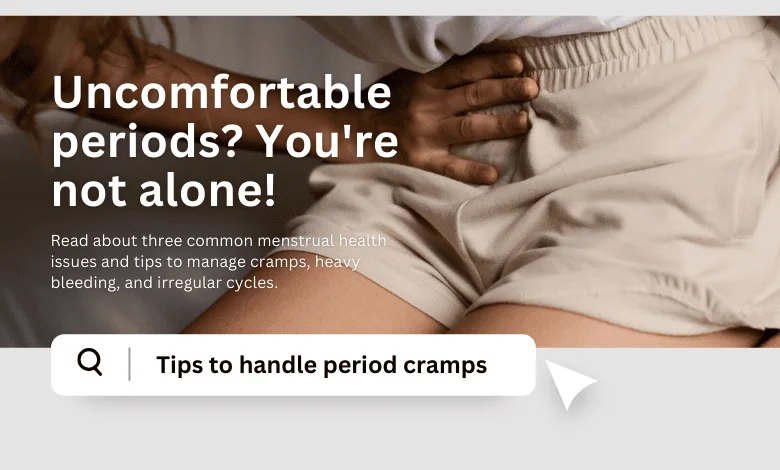3 Common Menstrual Health Issues and How to Address Them

When you hear the words, “menstrual health,” your period may be the only concept that jumps to mind. While that’s certainly part of it, menstrual health is so much more. It involves your physical and mental health, your social well-being, and the presence or absence of disease.
This broader definition recognizes the enormous impact your monthly cycle can have on all aspects of your life. That’s why if you suffer from any of the many common menstrual health issues, it’s wise to address them sooner, rather than later. Here are three and what you can do about them.
1. UTIs
Urinary tract infections are extremely common in women. If you have ever had one, you know how uncomfortable they can be. And although they aren’t rare, not treating one can lead to serious kidney infections.
If you have had UTIs and notice they seem to correlate with your period, there’s a reason for that. UTIs develop when the acidity levels in the vagina, referred to as “vaginal pH,” are out of balance. During your period, healthy bacteria levels may decrease, which leads to a higher vaginal pH. That acidity creates conditions ideal for the growth of harmful bacteria, which lead to UTIs and other vaginal infections.
When you begin experiencing the symptoms of UTI, you probably call the doctor for an antibiotic and break out the cranberry juice. However, the best way to manage chronic UTIs is to address them routinely by adding a UTI Supplement to your daily regimen. Find one that’s made from natural cranberries and other ingredients, and you might be able to avoid antibiotics. You should also drink plenty of water, wear breathable underwear, and avoid using scented products in the vaginal area.
Periods can be bad enough. But there’s nothing pleasant about burning and smelly urination, fever and chills, fatigue, and back or abdominal pain symptomatic of UTIs. Getting out in front of them might be the offense you need to keep them at bay.
2. Depression
Depression is complex. It’s not caused only by a chemical imbalance in the brain. Genetics, stressful events in life, faulty mood regulation in the brain, and hormonal fluctuations may also be to blame. Although research has much to learn about depression, it’s a common menstrual health issue for many women.
Of course, some women experience more serious depression than others. Those who suffer from PMS may have symptoms of depression. Those who suffer from premenstrual dysmorphic disorder may suffer such severe depressive and other symptoms that the condition requires medical treatment.
Depression from PMS and PMDD are linked to the hormonal changes that occur with the menstrual cycle. Estrogen and progesterone fluctuations are part and parcel of periods, affecting dopamine and serotonin, which are both hormones and neurotransmitters. But don’t discount the life events that may lead to mood changes.
For some women, their period is one of those stressors, especially if it affects their normal routine. For example, women with extremely heavy periods may not want to leave the house to avoid embarrassing accidents. A period can also take a heavy toll on intimate and social relationships.
To address depression, you should talk to your doctor. Oral birth control can help reduce feelings of depression. SSRIs can be prescribed for more serious cases. And don’t forget the value of talk therapy where you can explore coping strategies. You may find some that can help keep your life “normal” during your cyclical changes.
3. Uterine Fibroids
Up to 80% of women will develop fibroids in their uterus before reaching the age of 50. Some women won’t know they have them because they’ll have no symptoms. Others won’t be able to miss the symptoms, experiencing heavy bleeding, long periods, and mild to severe abdominal pain.
These muscular tumors grow in the uterine wall. They’re almost always benign, but a severe medical issue, nonetheless. Moreover, the bleeding and pain they cause some women can lead to mental health issues like depression and take emotional and social tolls.
What causes fibroids isn’t known, although genetics and the hormones estrogen and progesterone are suspected to play a role. An ultrasound will verify the presence of fibroids. Then, you should talk to your doctor about your options for getting rid of them. Hormones in oral and IUD contraception and hormone agonists, which prevent the ovaries from producing sex hormones, are common treatments. Some surgical procedures cut off the blood flow to the tumors and a surgical myomectomy removes them from the uterus.
Fibroids typically shrink during pregnancy because blood flow is focused on the fetus, likely starving the tumors. Although this certainly isn’t a good way for most women to address the issue, it may be for some. Left alone, heavy bleeding can cause severe anemia. Consult your healthcare provider about finding the best treatment solution for you.
Take Charge
Let’s face it. Menstrual health is a major factor during the lifetime of women. For some, their cycles are just a minor inconvenience. For others, cycle-related health issues can exact a serious toll on their physical, mental, emotional, and social health.
Regardless of which camp you’re in, you should address any menstrual health issues as soon as you begin experiencing them. Even better, get out ahead of them when you can. An ounce of prevention is, indeed, worth a pound of cure.






